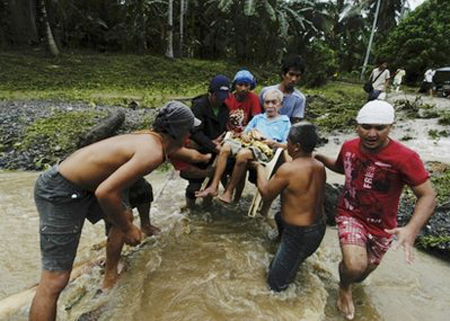Asia faces the risk of mass migration
Tens of millions of Asians will be displaced by the effects of extreme weather events, the Asian Development Bank (ADB) warned.

Lifeguards and volunteers help an elderly man run flooding in Davao del Sur province,
Philippines on January 18.Photo: AP.
AFP leads a draft ADB report, entitled " Climate change and migration in Asia-Pacific ", said, if governments are not prepared for mass management of migration. From now on, Asia will face a series of humanitarian crises in the next few decades. People can migrate internally or across borders.
The report said that Asian governments are now aware of weather changes caused by global warming. However, most governments have not outlined policies and mechanisms to prevent the impact of climate change on the population.
" It is clear that Asia-Pacific is one of the areas most affected by climate change. These include increased temperatures, changes in rainfall, shifting rainy seasons, and increase the power of tropical storms, the frequency of floods, "the report stressed.
ADB's report was prepared in the context of floods in many parts of Asia-Pacific. Australia has been one of the countries affected by floods and storms in recent weeks. Last year, several million people were evacuated because of disasters in the Philippines and Sri Lanka in 2010.
" Asia and the Pacific are vulnerable to high environmental risks and high population density. Therefore, the population change phenomenon in this continent will take place on a large scale never seen in a few decades. next century , "the report said.
The Center for Disease Research (CRED) in Belgium announced that 89% of 207 million people affected by disasters last year lived in Asia.
" Many governments are not ready to deal with the risks posed by mass migration. That's why ADB drafted this report. We do not have an international coordination mechanism to control migration. Resident due to climate change Policy makers should act now , "said Bart Edes, a senior ADB official.
- A series of Palestinian graves were discovered
- Why are mass murderers often men?
- What does rubber molecule have to do with mass migration?
- Asia is still at risk of catching Ebola
- Zebras record the longest migration on the continent
- The truth about the risk of super-earthquakes in Asia
- Warning of migration risk massively when the temperature increased by 2 degrees Celsius
- See the migration process of animals in 3D
- Asia faces temperature
- New discoveries about the migration habits of monarch butterflies
- Genetic evidence of human invasion of the world
- Southeast Asia: mass death of corals
 Is the magnetic North Pole shift dangerous to humanity?
Is the magnetic North Pole shift dangerous to humanity? Washington legalizes the recycling of human bodies into fertilizer
Washington legalizes the recycling of human bodies into fertilizer Lightning stone - the mysterious guest
Lightning stone - the mysterious guest Stunned by the mysterious sunset, strange appearance
Stunned by the mysterious sunset, strange appearance